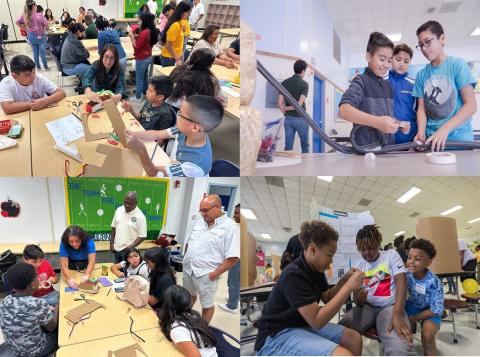Body
Image

St. Elmo Brady STEM Academy
This project is an informal STEM intervention that combines partnerships between STEM and education faculty at the University of Houston with mentorship from the participants’ families and STEM undergraduate mentors to provide hands-on STEM experiences to fourth and fifth-grade students of color. The project aims to increase awareness of and interest in STEM careers and broaden participation in STEM careers. Program components include hands-on activities that engage students with technology through the engineering design process that are led by undergraduate STEM mentors who also are from groups underrepresented in STEM careers; Scientist of Week, which exposes students either to a STEM pioneer from underrepresented groups or a STEM professional from an industry partner; the math problem of the day; and an end-of-year interactive STEM fair, during which students demonstrate their knowledge to larger audiences from their schools and communities. The research questions that guide this mixed-methods project include: 1) What strategies help conceptualize STEM knowledge in a manner that affirms students’ racial identity and cultural ways of knowing? 2) How do students’ STEM identity and awareness of and interest in STEM change over time? 3) How do families engage in their children’s STEM learning in out-of-school STEM communities 4) What motivates STEM undergraduate students to become mentors, and what roles do they enact and why?
Pillar 1: Innovative Use of Technologies in Learning and Teaching
Weekly, youth participate in hands-on engineering design activities that engage them with technology by building with the engineering design process as their framework. In addition to building innovative solutions to the weekly engineering design challenge, they also become ongoing users of standard tools used in STEM labs and industry (e.g., beakers, scales, lab notebooks). Recent activities have included windmill design, shoe design, and polymer exploration.
Pillar 2: Partnerships for Career and Workforce Preparation.
By partnering with local companies, we emphasize the possibilities of engineering careers. We include industry partners by (1) inviting them to volunteer during Saturday sessions, (2) inviting engineering professionals to serve as Scientist of the Week, and (3) highlighting the span of careers available at their companies (e.g., those that require certificates, two-year degrees, and bachelor's and advanced degrees). Participants get to interact with industry representatives and ask about their careers.
Pillar 3: Strategies for Equity in STEM Education
SEBA uses assets-based approaches and embeds equity throughout the program design. We are implemented in two of Houston’s most diverse areas, thus connecting us to families who are historically underrepresented and underserved in STEM Education. Mentors are from similar backgrounds as participants. Mentors are paid to support them if they have to work to pay for school and trained in culturally responsive pedagogy to support the formation of strong relationships with participants.

Discipline(s)
Chemistry
Engineering
Life sciences
Mathematical sciences
Physics and astronomy
Target Gradespan(s)
Elementary school (K-5)
Target Participant(s)
Youth / students
Parents / caregivers / families
American Indian/Alaska Native participants
Black/African American participants
Hispanic/Latino participants
Native Hawaiian/Pacific Islander participants
Project Setting(s)
Informal Education
Category
Developing and Testing Innovations (DTI)